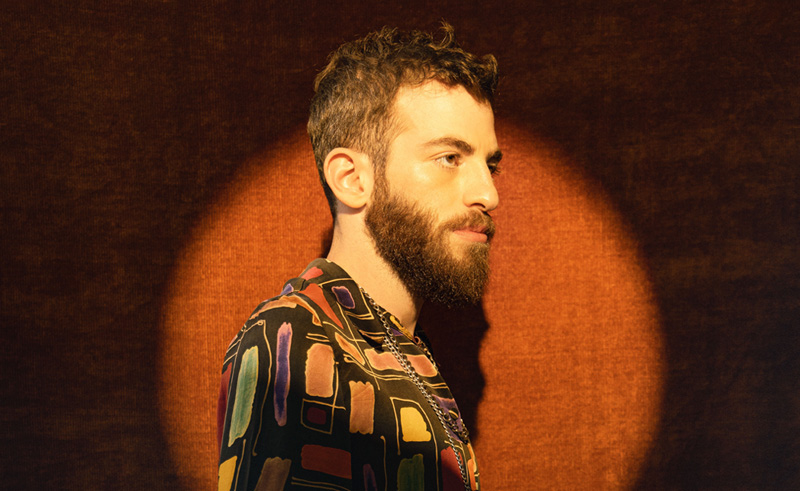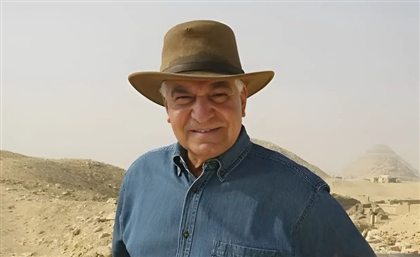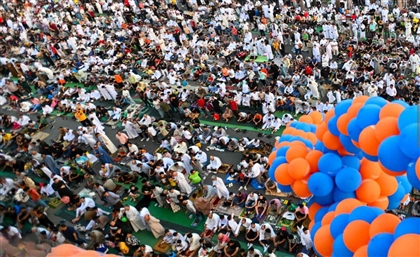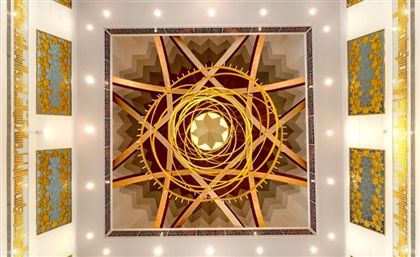Sleiman Damien: The Producer Reconceptualising the Music Mainstream
Having produced for the likes of pop icons Abeer Nehme and Assi El Hellani, Damien is lifting up a new generation of artists to fuse the line between mainstream and indie music.

If you weren’t already familiar with Sleiman Damien, now is about time to put the Lebanese music producer and hitmaker on your radar. Having arranged, composed and produced for pop icons like Assi Hellani, Haifa Wehbe, Georges Wassouf and Nassif Zeytoun, Damien is a veritable driving force behind Lebanon’s pop music industry. SceneNoise sat with the pop producer for a wide-ranging conversation exploring the inner makings of a chart-topper and unpacking his determination to fuse the line between mainstream and independent music spheres.
Damien gained credibility among the industry giants through his ability to create musical concoctions that whet the appetite of Arab audiences as well as those not yet exposed to Arabic music. In 2014, he led the musical arrangement of Sahranine by Carole Samaha, which immediately shot to fame and has recorded 7M YouTube views to date. The track incorporated elements of EDM, recognisable in the catchy syncopations of helium vocals that hop-scotch over the refrain. This was the first milestone in his career that won him the attention of other pop giants and built the momentum for further accolades.
In light of Damien’s star-studded portfolio, he seems to possess an intuitive sense of the balance of sounds that make a chart-topper. Yet, for all his prowess creating beats for the biggest names in the industry, Damien is equally drawn towards working with independent artists such as singer-songwriter Zef and Syrian-Kurdish electronic artist Rizan Said. This twofold propensity is what defines Damien’s position at the frontline of music production in the region, dissolving and reconceptualising the threshold between the mainstream and independent spheres.
As the music industry continues to experience what he has called a “democratisation of genres” and compositional styles, where artists are increasingly seeking to fuse and combine different elements, Damien will be well-equipped to shape future trends in the music industry. SceneNoise sat with Damien to explore and unpack his vision for the new ‘mainstream'.
Was music production always an aim, or was it a fortunate accident?
I can’t really remember a time where I wasn’t trying to make music in some capacity. As a child I was always starting bands with friends and then getting kicked out of them because I could never get my skills up to par for live performances! This wasn’t helped by the fact that I’d get incredibly anxious on stage and would have regular panic attacks.
Music production allowed me to create something in my room, at my own pace, in my safe space. I could bring my musical ideas to life without having to play in front of a live audience. It was fun and therapeutic; I’d spend hours and hours in my own bubble, experimenting with sounds, melodies and rhythms because I could, and because I needed to.
As for how it turned into a career, a lot of it was being at the right place at the right time, but also doing the right thing, putting in the work, the hours, the research. When good opportunities with great artists came up, I felt ready.
One of your most celebrated achievements is working on ‘Bala Ma Nhess’ where you produced, arranged and mixed for the Lebanese icon Abeer Nehme. It’s an intricate musical arrangement: you’ve got the orchestral glissandos and the gentle throbbing of the drum in the intro that create an intimate soundscape. I wanted to explore your process of producing sounds like this. How intentionally constructed is each musical element?
I can’t tell you how fulfilled I felt after making this record. I still listen to it and notice tiny details I barely even remember myself working on.
The truth is, every song I’ve worked on starts out with a lot of trial and error and self-doubt. No matter how much you try to carefully plan your ideas and make intentional decisions in music, the song itself will often dictate certain aspects that arise naturally as you’re working.
With ‘Bala Ma Nhess’, I initially wanted to go into a completely different direction with it. I spent days working on it, only to wake up one day feeling like I couldn’t connect with it emotionally. So I took a small break, came back with fresh ears, and the new direction and execution came to me so naturally I finished the whole song in a few hours. I feel like this happens to me a lot, especially when I’m working on a project that resonates with me before I’ve even touched it.
Do you believe in the philosophy of ‘stumbling across’ a hit record?
Very good question. I might get a lot of hate for this, but in my experience, I’ve never seen anyone accurately predict if a record is going to be successful or not. The social, political, economic and emotional intricacies of music consumption make it impossible to tell in advance whether a song will resonate with people.
I’ve made so much music in my life that I truly believed would break the industry – only for the track to be met with low to moderate success. Similarly, I’ve made so many tracks which I felt would only reach niche markets, but then ended up blowing up in the mainstream.
What I can definitely tell you is that no matter how you feel about the chances of a record you’re working on, it’s crucial to create something you’ll know you’ll be proud of and will enjoy listening to in the future. Every single time. That’s how hits are made – if you’re lucky, that is.
The specific role of the producer in the music industry is sometimes ambiguous. It’s often stated that a good producer will first put themselves inside the mind of an artist and their fanbase. The legendary Nile Rodgers even asserted that producers have to “meld into the artist’s alter ego” and to “be an extension of who they are” to deliver the appropriate sound. But then, one of your most unique qualities as a producer is the ability to steer an artist in a new direction.
How do you strike this balance? Adonis, the pop-rock band whom you’ve worked with, have described you as a “fifth band member.” How much do you incorporate your own personal contributions, values and vision to a song?
I think we can all agree how hard it is to challenge someone like Nile Rodgers who’s had such a massive impact on music, so I won’t. Whilst there are many producers who release originals and become artists themselves – that’s definitely in the works for me – I’m focusing, for now, on other music artists, and making sure their work sounds as good as it possibly can.
This means my role involves helping artists find and express the emotional message that appeals to their existing audiences. Other times, it means creating new sounds for artists trying to reach a different audience. Either way, the artist is ultimately the one to face the world with the record in their hand, and so that’s all that matters.
In the case of Adonis specifically, I had the honour of producing two albums I’m exceptionally proud of. It was an enormous change of direction from their earlier material, and it wouldn’t have been possible without a lot of cross-collaboration and soul searching from all parties involved. We came out of it feeling like a family, and I believe that’s what Anthony [Khoury] meant by his comment.
Surely it’s a tricky task to steer artists to a new direction when it comes to pop idols like Georges Wassouf or Nassif Zeytoun? They’ve been making music for decades and have established a distinct artist persona and fan-base.
It’s certainly a challenge I had to grapple with when I began producing music for mainstream artists, because when you’re first starting out, you don’t have the credibility and track record to convince bigger acts to experiment and create something fresh.
Happily, with the market changing so quickly, fortune has truly started favouring the bold. I can safely say that the vast majority of artists who approached me in recent years did so specifically because I could steer them into new sonic territories.
That reminds me of something you’ve previously coined as a “democratisation of genres.” Can you elaborate on this?
The musical sphere that listeners have been led to understand as the “mainstream” is now rapidly changing. There isn’t a music professional in the world today who isn’t aware of that. Who could’ve predicted the meteoric rise of Egyptian hip-hop ten years ago, or the relatively recent global spotlight on traditional Kurdish music, or the hundreds of alternative Middle Eastern acts who are boldly competing with regional superstars on the same editorial playlists?
Sure, there are pros and cons when it comes to contemporary habits of music consumption. But the sheer musical diversity that has been brought upon by streaming, social media and the internet has guaranteed music creators a much more fertile ground to sow for hopefully many years to come.
You already seem to be really awake to this, judging by the incredibly diverse range of musicians you’ve worked with, from pop idol Abeer Nehme to singer-songwriter Zef and Kurdish electronic legend Rizan Said. When listening to your productions, I get a real sense of how this breadth has helped you enrich each musical piece. How do you pull it off?
Thank you for that! I take great pride in my capacity for versatility and adaptability. The truth is, I listen to and enjoy and obsess over such a diverse range of musical genres and aesthetics that I could never find it in myself to stick to one.
I can understand producers who prefer to specialise and excel in one specific sound and it’s commendable if that is what works best for them. For me, I make it a point to treat every song, every project as a journey of discovery and learning. I like to think that taking on such a range of projects not only makes me a better producer, but also and more importantly, a better listener.
You’ve worked with the wonderful Dana Hourani on her album Ensanein. I noticed that you co-produced some of these tracks with multi-instrumentalist Nasir Al Bashir and singer-songwriter Zef. How do you find these co-productions and how does the experience compare to producing by yourself?
Historically, the previous generation of music makers – especially from our region – were always reluctant to join forces. I couldn’t tell you whether it was a cultural thing, or if it was out of ego, or if maybe it was just that the right market conditions weren’t there.
Most, if not all, young producers making waves today are all about collaboration, teamwork and co-creation. We have so much to learn from each other, to share with each other, so many ways to lift each other up musically and professionally. I couldn’t be prouder of this generation.
You’ve been vocal about your determination this year to reach out to more independent artists. What’s motivated this? What do you hope to create?
That’s the focus right now. I could go on and on about market trends, but the songs on our playlists speak for themselves. If you’re a new artist who has something special to present to the world, the time is now. The gap is massive. People want something new, quickly, and you better catch their attention before they move on to something else.
The plan is to be at the forefront, helping as many talented and creative acts cross the finish line. I’m blessed to be working with Tarek ElMendelek, my manager, on scouting and discovering the next big sound, the next generation of chart dominators. He’s always been a big supporter of rising and developing artists that eventually crossed over and blew up. He has a flawless ear for this. I feel we have a strong strategy and very exciting targets. It’s going to be a big year.
- Previous Article Five Ways Startups Can Manage an Economic Downturn
- Next Article Palace Restoration Projects Underway in Saudi Town of Najran
Trending This Week
-
Mar 29, 2025























